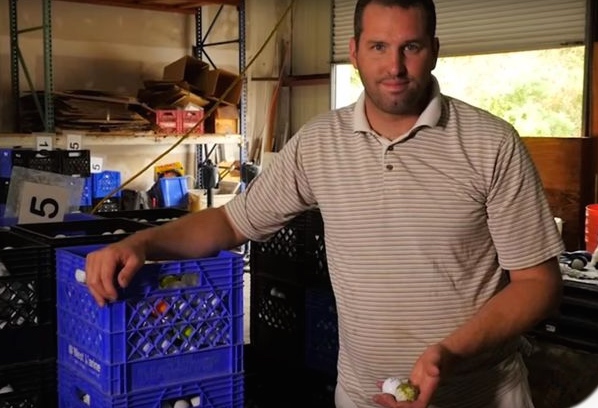Golf Bedlam
Latest > The Foozler: He hates golf, we make him play
Sep 1st, 2016
The Foozler: He hates golf, we make him play
Episode 3: Foozy goes diving for lake balls...
Words: Ben Marshall Photography: Steve Read
Foozler: (noun) a hacker; one who is rubbish at golf.
The term was coined by original GolfPunk P.G. Wodehouse.
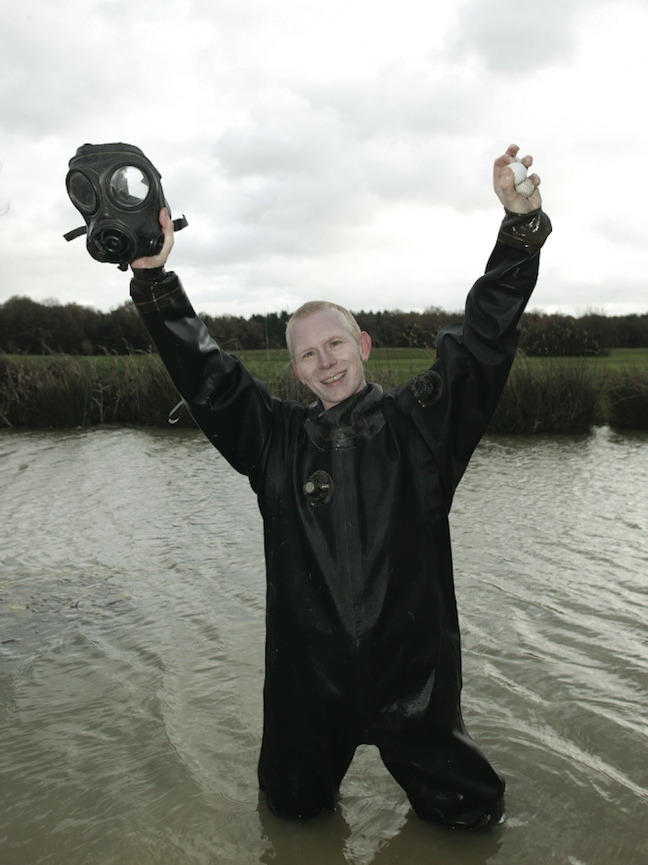
The Foozler. No stranger to tetanus injections...
Back in 1998 John Calabria, Vice President of research at Maxfli, estimated that more than half a billion golf balls went missing every year. He added the cautious caveat that this was probably a conservative estimate as more than a billion of them were produced and sold in ’98 - likely as not to replace those that had been lost.
In 2015, 300 million balls were lost in the USA alone. All golfers know how easy it is to lose a golf ball, but how do you go about losing 300 million or, indeed, half a billion of them? And how come I, crouched up to my neck in a coffee coloured lake, my hands dragging through the weeds and mud and numb with the November cold, cannot find a single bloody one of them; I am on the Foxbridge Golf course in West Sussex. To be precise I am in the middle of one of their eight lakes, and I am looking for cash.
According to Calabria’s calculations, if you lined up all the golf balls lost in 1998 dimple to dimple they would stretch all the way around the world’s equator. Or to put it another way you could almost have filled the Empire State Building with them.
Apparently you’d have reached as far 86th floor observation deck before you ran out. And that was back then, before Tiger phenomenon made golf as hip as The Chain Smokers (apologies if you're not hip enough to know who they are! – Ed) and as popular as sex. A whole lot more people play golf now than they did back in the 90s. Nowadays, if filling iconic architecture with golf balls is your thing, you’ll have to look further afield. I’d recommend the Petronas Twin Towers in Kuala Lumpur.
Golf balls are big business and as a consequence so is golf ball retrieval. Not so long ago golf ball manufacturers imagined that counterfeiting was the biggest threat they faced. Acushnet, the world’s largest producer of golf balls, began stamping its Titleist and Pinnacle brands with an invisible digital fingerprint in order to protect their product.
It’s now dawning on them that the biggest risk to their profits (or rather the continued growth in their profits - they’re a long way from posting out begging letters) comes not from fakes but from their own product being dragged from the water hazards of the world’s golf courses. There’s gold in them there lakes.
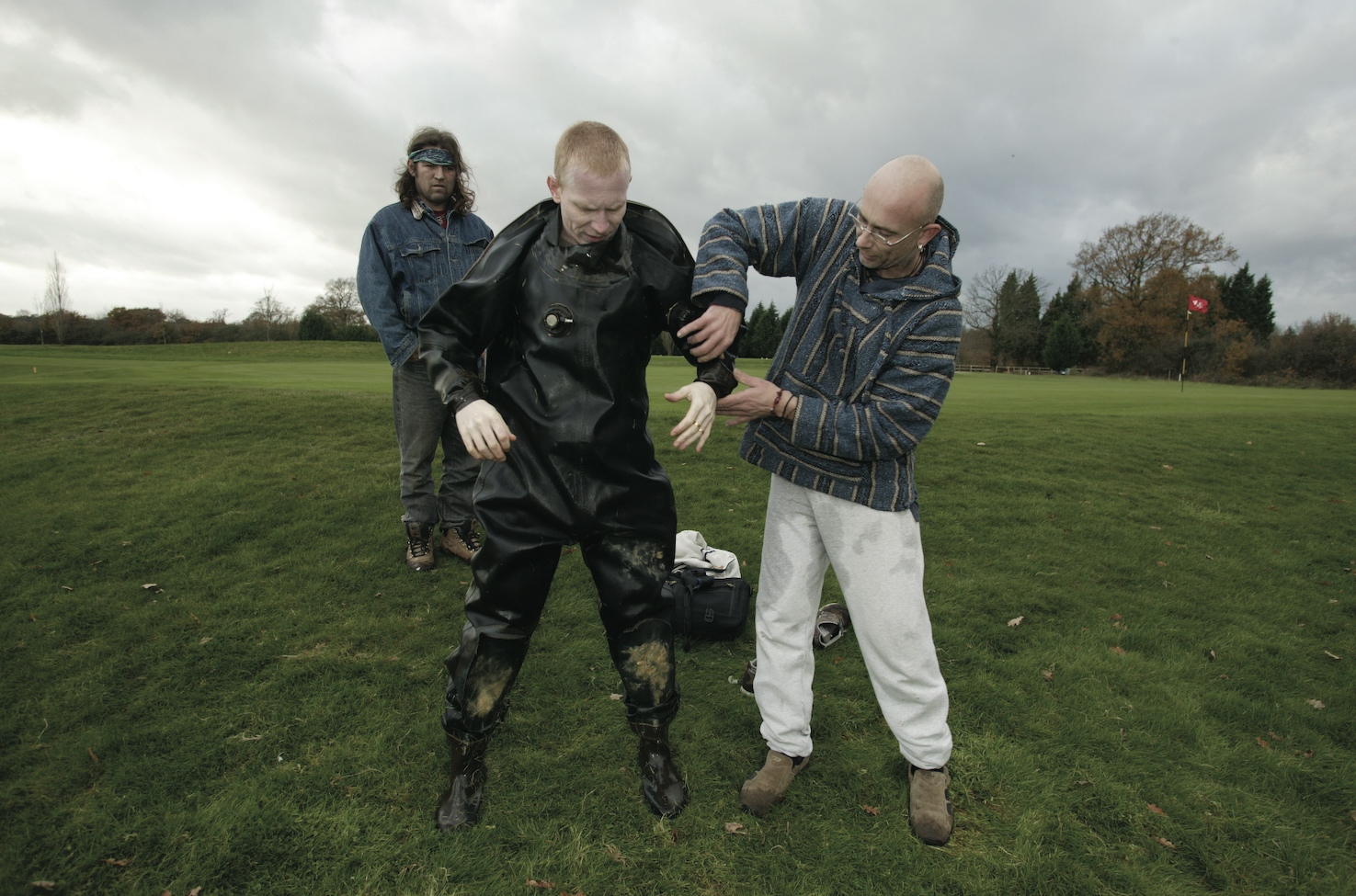
"What if the fish think I'm some sort of human licourice allsort?"
Swampy, a professional golf ball retriever, claims to be one of the first people in Britain to have realised just how much money could be made from scavenging the nation’s golf courses.
“I was brought up behind a golf course,” he explains. “I used to mess about near the lakes and would watch as these golfers knock in one ball after another. It doesn’t take a genius to work out that if you can get hold of the balls, you can sell em.”
Swampy, an affable hippie who peppers his estuary English with rock’n’roll aphorisms (‘for real, man’, ‘It’s not where you’re from, it’s where you’re at’ etc...) came to this realisation at the ripe old age of six. Now, 30-something he has, if he is to be believed, employed his youthfully acquired entrepreneurial nous to considerable financial benefit. He reckons that in a modest year he’ll pull in a cool 60k.
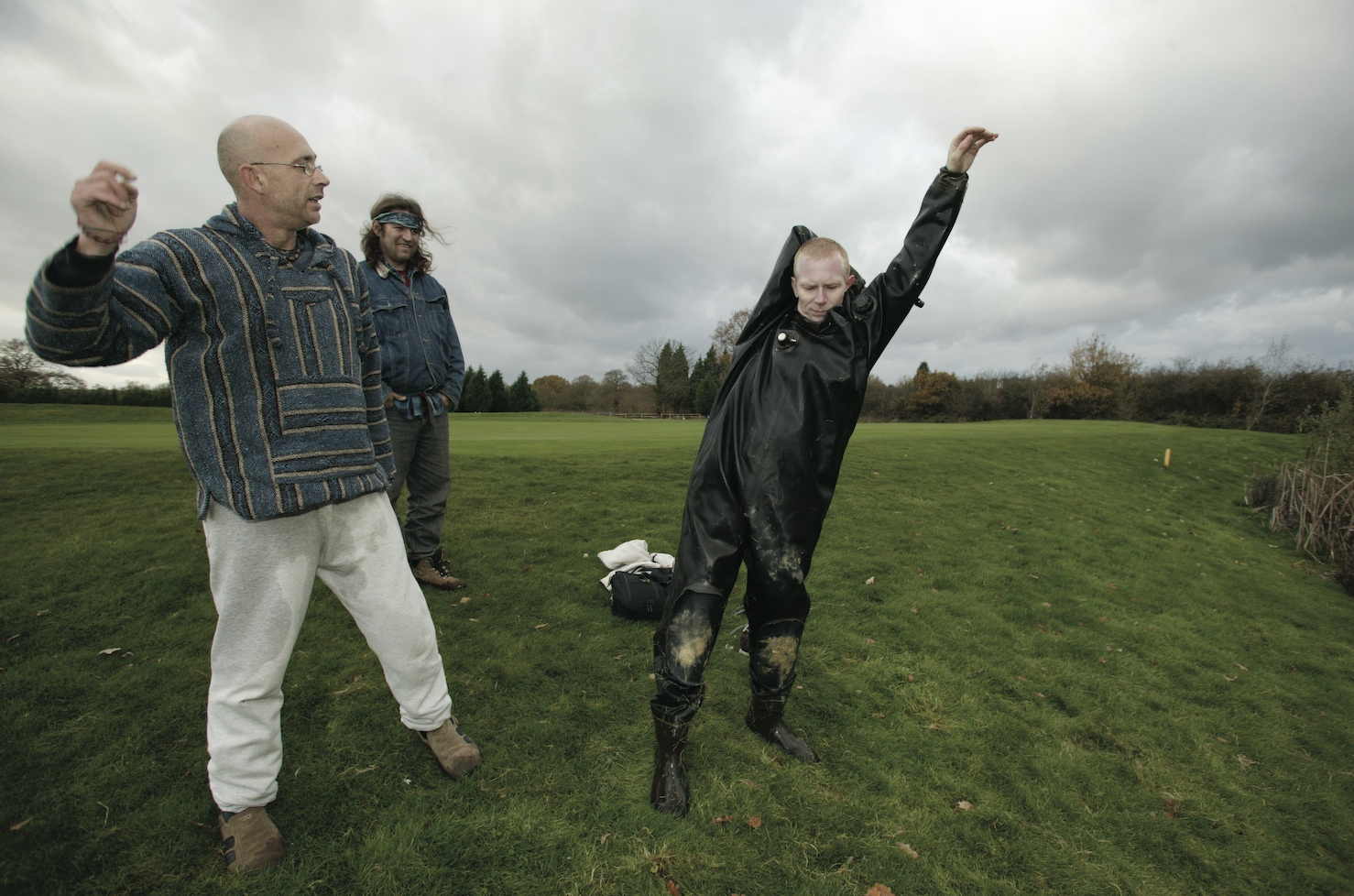
"This is no time for dancing, Foozler..."
The golf balls he retrieves are either sold back to the golf club (at anywhere between 15 pence to a pound depending on the quality of the ball) or on to big-time players like www.lakeballs.com. Not that it’s money for old rope, as I swiftly discover. Even with a teacher as patient and good humoured as Swampy, pulling balls from the water is no easy task.
In a dry suit that weighs as much as I do, wearing a mask that makes me look like a post apocalyptic serial killer, I thrash about haplessly, while Swampy makes the whole thing look embarrassingly easy. In less than 15 minutes, he has filled a wire net with more than 200 balls. “There’s sixty quid right there,” he announces triumphantly.
“The secret,” he explains, “is to know your territory. There’s not a course in the south of England I don’t know. You see, you need to know where a ball’s gonna land. Most golfers don’t hit the ball high enough, so the balls basically scoot across the grass and land in the water right near the bank. It’s very rare I’ll need an aqualung, but, you know, needs must and all that . . .”
You also need balls to find balls. Big brass ones. It’s never a picnic diving through the inky water. There are the obvious hazards – rocks can turn your knees into mush and broken bottles that can cut your feet to ribbons. In Florida, where Swampy also spent a stint diving, alligators are a perpetual menace (“Pesky f*&$X£*”).
The heads of turtles, you may or may not be surprised to learn, can feel a lot like golf balls; and turtles hate being confused with golf balls. Countless fingers have been snapped off in search of that elusive Pro V1. In this country, the cold can reduce even the hardiest of divers to a snivelling wreck.
More seriously, people have died trying to cash in on the insatiable demand for cheap, quality balls. In January 2001, Mark Feher, 21, was dragged from a lake at The Links Of Boynton Beach, Florida by his brother Akos and pronounced dead at JFK Medical Center in Atlantis.
In 2005, the Sheriff's Department of Cherokee County, Georgia, recovered the body of an illegal immigrant, Roberto Alvarez, from the bottom of a four-acre pond at Towne Lake Hills Golf Club, outside Atlanta. He had drowned while attempting to collect the errant golf balls that had splashed down between the fourth and eighth holes.
Alsoin 2005, 29-year- old Jonas Pitchford was found dead and floating in one of the water hazards at the Sherwood Forest Country Club in Baton Rouge, Louisiana.
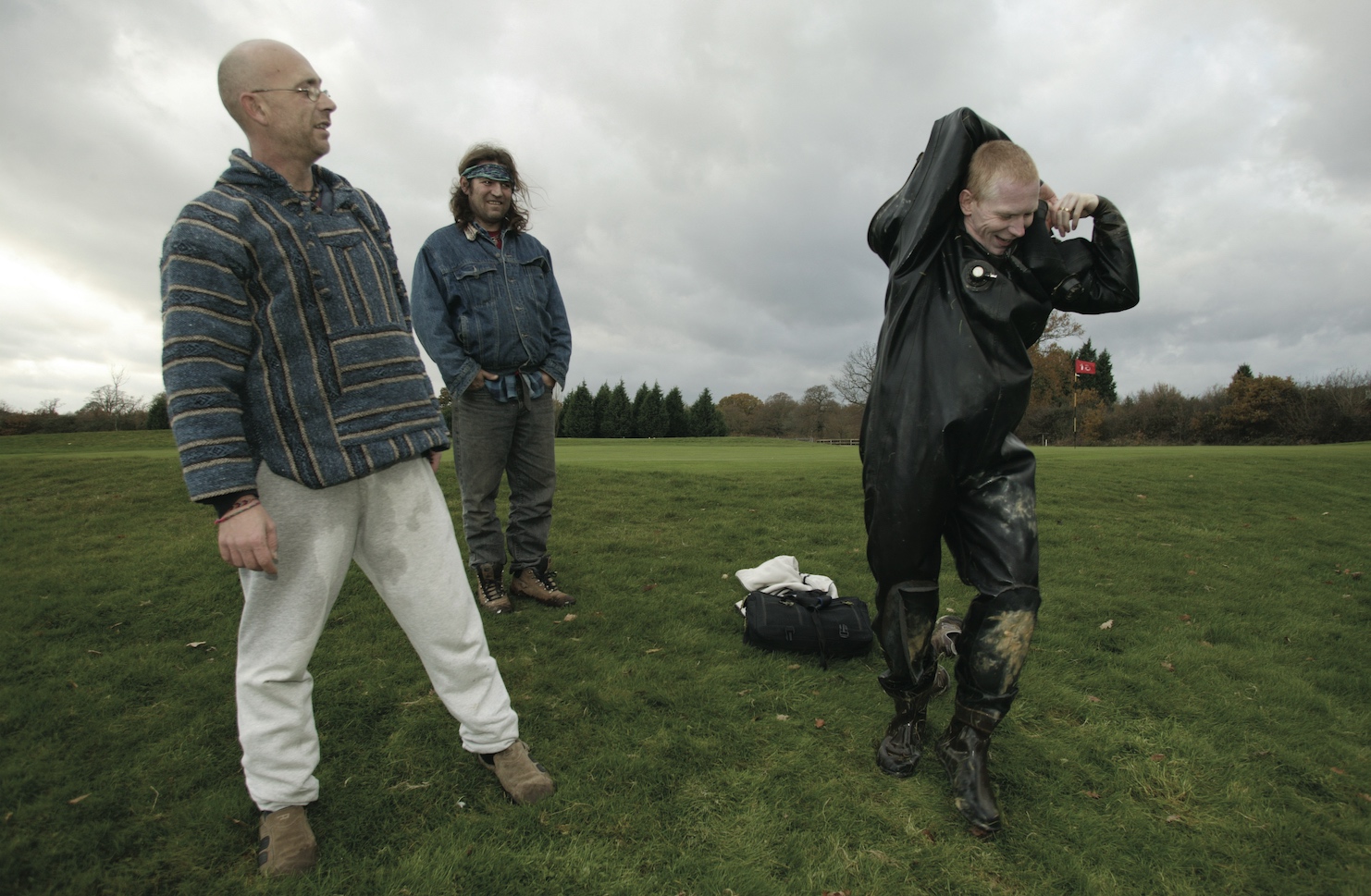
Always keen to give the punters extra, Foozler gives it his best Riverdance impression...
According to Swampy, though, the real menace faced by divers like him comes, not from faulty aqualungs or unnecessary risk-taking, but from other divers. Swampy is about as legit as you get in the thoroughly murky world of golf ball recovery. Having started early and freelancing for lakeballs.com he has cultivated relationships with the owners of golf clubs across the south of England. They know and approve of him. He makes money and makes them money.
Just how much money is being made in the expanding business of golf ball recovery is something of a moot point. This is the sort of cash-in-hand racket of great interest to the Revenue. One estimate suggests $2-300million a year. What is certain is that fishing for golf balls is far more profitable than fishing for fish.
“The problem are the guys who do the lakes in the dead of night,” explains Swampy. “They turn up mob-handed and do eight lakes in a couple of hours. You turn up the following day and there’s fuck all there to be recovered.”
Paul Clark, owner of the Foxbridge Golf Club and one tough-looking customer, concurs: “There are more and more freelancers. I am convinced they’ve been diving my lakes at night. You see tyre tracks, balls covered in mud and weed. I mean it’s theft isn’t it? First it’s the lakes the next thing you know they’re robbing the bloody clubhouse. They’re no better than burglars.”
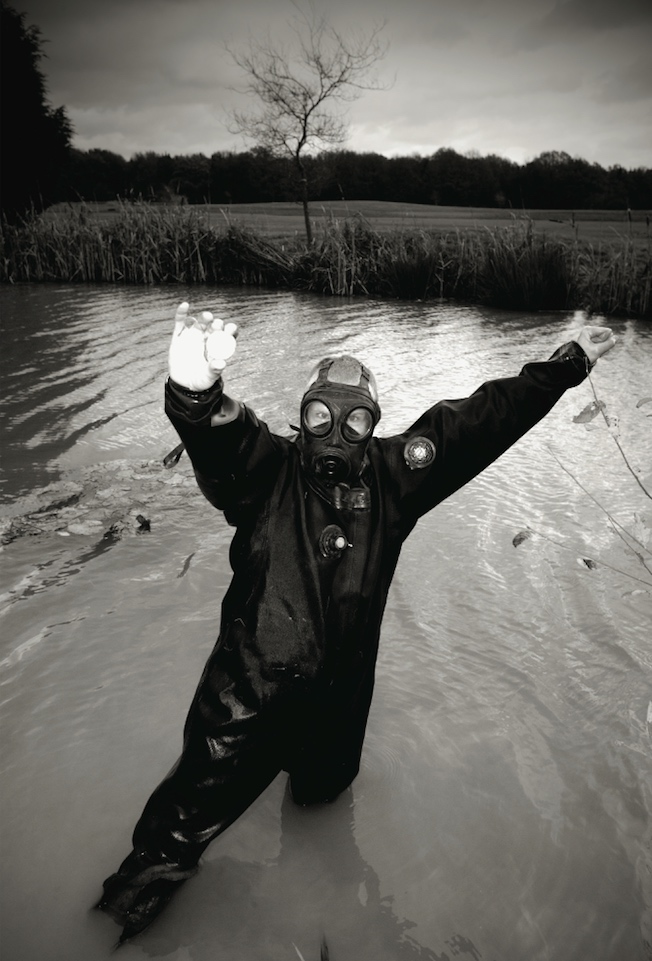
That's a swan egg, I'd put it back if I were you...
Paul uses the word ‘burglars’ with great feeling. This is understandable, given that this is his club and he doesn’t much fancy the idea of a bunch of herberts in Cambridge rapist rubber masks tearing it around his course at four in the morning. In strictly legal terms, however, he is wrong. In a landmark ruling in 1998, Philip Azonca and Gary Thewlis were acquitted at Stoke Crown Court of the theft of golf balls from a golf club in Burton upon Trent. Phil and Gary recovered more than 800 balls from a number of lakes on the course.
The club argued that the balls belonged to them and that when players knocked balls into the lakes they had five minutes to recover them. If they failed to do this, they had to play another ball. The lost ball in the water then became the property of the club. The club had to argue this as twice a year the balls recovered from their lakes were then sold in their pro-shop. For cash, natch.
Judge Simon Tonking directed the jury to acquit Phil and Gary: "Property which has been abandoned cannot be stolen,” he explained. “If property has not been abandoned, but a defendant genuinely believes that it had, that defendant cannot be convicted of theft".
Of course given the odd way our legal system works, Judge Tonking’s decision is by no means set in stone. It seems likely that our new Anti Social Behaviour Orders may soon be employed to combat night divers. Trespass laws could also prove reasonably fruitful. So the future legal status of these mavericks could soon be almost as vague as their tax returns.
“Chancers,” says Swampy. Paul nods robustly. A few hours later and twenty miles west of Foxbridge Golf Club I am introduced to just such a chancer. His name is Sid and he arrives in the company of an Australian-Italian acid casualty called Mario, who looks like he spent the summer running through every thrift store in Haight-Ashbury covered in super-glue.
These divers, like some surfers I have met, seem to run exclusively on adrenalin and mind-altering substances. Sid has been playing golf since he could walk and raiding golf courses most of his adult life.
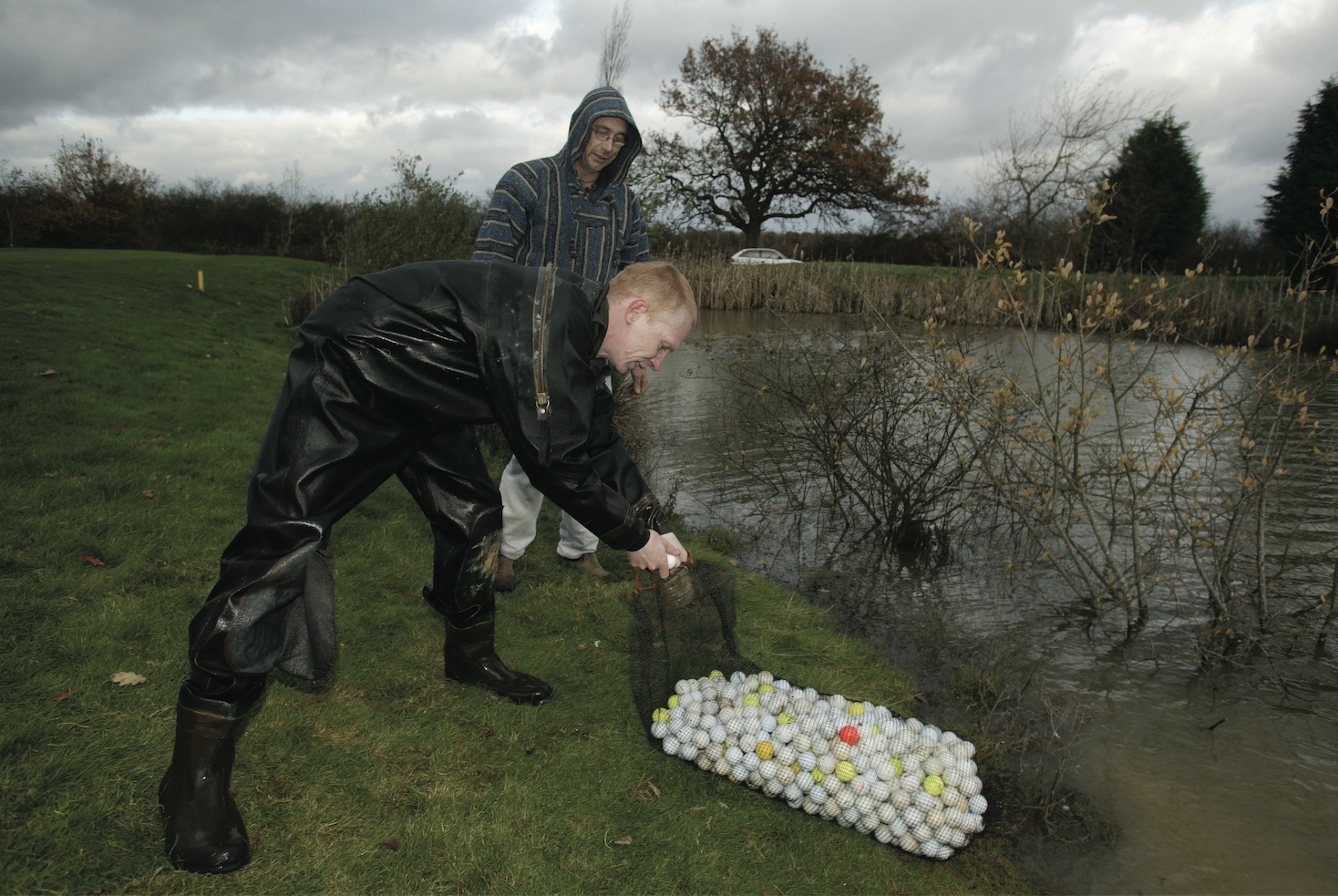
Not bad for 12 weeks work...
“Who’s the richest man in the world?” asks Sid suddenly.
“I dunno,” I reply. “Bill Gates maybe, or that bloke who owns Ikea...”
Sid shakes his head: “No man, it’s the man who doesn’t need a thing. See I don’t need nothing. I have no address, no wife, no letterbox. All the problems in the world come through wives and letterboxes. I don’t have neither. I’m free. I got money, drugs, wheels and golf. Proper fucking free.”
I am trying to work out what this has to do with lake ball diving when Mario comes alive.
“When Sid’s down to his last twenty, he sticks petrol in the car and we do a golf course. 600 quid. Thank you very much. Grazie, grazie..”
Sid chips in: “And I buy shit cars. No point in buying a good car if your gonna fill it with filthy golf balls. And golf balls weigh, man, they really weigh. They fuck with the suspension. You gotta get a car that you don’t mind trashing and you don’t mind abandoning. You need a shit car.”
Somewhere not far from here Sid rents what he loftily describes as a workshop. It contains several washing machines lined with astro-turf and tens of thousands of abandoned golf balls.
“Same with washing machines,” he elaborates. “You don’t buy the latest Zanusi. You get car boot sale stuff, a tenner a drum. Use some of that Finish Power Ball shit. And the golf balls...” he sighs a wistful sigh, “they come out snow-fuckin'’-white. Like new. Beautiful man.”
“You know what you should do, man?” says Mario.
“What, man?” says Sid.
“You should sell ‘em back to the manufacturers. You know, like: ‘You either buy ’em from me you capitalists, or I flood the market.’ The balls! Sell ’em back to the people who make them so they can destroy ’em and sell their new shit to golfers. Sort of like Brad Pitt in Fight Club. Money for everyone, man.”
“No, man,” replies Sid, visibly pained by the suggestion. “That’s immoral. That’s not ecological.”
A little while later, Sid is complaining about the market. Nowadays, even eco-minded hippies like Sid have to watch the market. Everyone’s getting in on the act. In his opinion, GolfPunk only makes matters worse.
“You’re alerting people, man,” he complains. “It’s getting very crowded out there. Very, very crowded.”
“Too many chancers?” I enquire.
“Too right,” he replies.
Mario seems to be nodding earnestly. Either that or he’s moving to a drum’n’bass beat no one else can hear.
“I was at the Foxbridge golf course earlier on,” I tell him.
“I know it,” says Sid.
“And the owner was complaining that someone is doing his lakes late at night,” I explain.
“Yeah man, that’s true,” he nods.
“How do you know?” I ask.
“Cos I’m the dude that’s doin'’ ‘em!” laughs Sid. “Fight the power, man. Fight the power!”
When Maxfli’s John Calabria first pondered the phenomenon of lost golf balls he also wondered at the new technology. As modern ball makers have turned to hi-tech plastics, the shelf life of balls has increased exponentially. Calabria says the Surlyn-covered ball has a negligible decomposition rate. "They'll be around for a very long time," he asserts.
In 1999, the New York Times interviewed him and the journalist wrote: “It is fascinating to think that eons hence, when paleoanthropologists from the Delta Quadrant are picking over our culture's long-buried remains, they'll be unearthing billions of mysterious little spheres.”
It is, indeed, a fascinating thought. But by then, Swampy, Sid and Mario may just have flogged them all to Alpha Centauri.
Many thanks to Paul and everyone else at the Foxbridge Golf Club, Plaistow, West Sussex. Thanks also to Gary at www.lakeballs.com and to Swampy, Sid, Mario and all the other divers who helped with this piece but cannot, for obvious reasons, be identified.

